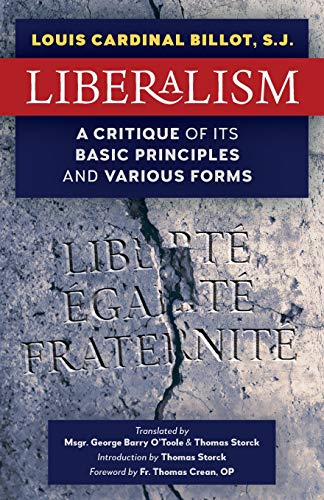Liberalism
A Critique of Its Basic Principles and Various Forms (Newly Revised English Translation)
S J Louis Cardinal Billot
BOOK REVIEW

In the contemporary political landscape, the mere whisper of "liberalism" ignites fervent debates, evoking notions of freedom, rights, and governance. Yet, few have delved into its foundational principles as intensely as S J Louis Cardinal Billot in his work, Liberalism: A Critique of Its Basic Principles and Various Forms. This is not merely an academic treatise; it is a bold manifesto challenging the very fabric of liberal thought as we know it.
Billot, with the piercing insight of a seasoned philosopher and theologian, dismantles the pillars upon which liberalism stands. With surgical precision, he exposes the contradictions that sit at the heart of liberal ideology, making the reader grapple with uncomfortable truths. If you believe that liberalism is a flawless doctrine advocating individual freedom and social justice, be prepared for a seismic shift in your perspective.
The author, a prominent figure within Catholic theology, holds an unwavering conviction that the principles of liberalism are not just flawed-they are detrimental. Drawing from his vast religious and philosophical background, he argues that liberalism, in its quest for freedom, often overlooks the essential role of moral law and authority. What happens when the quest for individual autonomy sours into chaos? Billot's critique is a clarion call urging us to reflect deeply on the implications of a society built on unchecked freedoms.
As readers, we are thrown into a whirlwind of arguments that oscillate between logical reasoning and passionate rhetoric. For every point Billot artfully dismantles, he assembles an equally compelling counterpoint that resonates with historical context. From the nuances of the Enlightenment to the anarchy of contemporary political movements, each chapter serves as a lens through which the repercussions of liberalism's oversights are examined. ✨️
Revisiting the author's deep-seated roots in theology, his work can also be seen as an exploration of the intersection between faith and politics. Billot's unwavering belief in a moral compass challenges you to reconsider the societal constructs you've taken for granted. With every page, the book reverberates with crucial questions: Is liberty truly an unbridled right, or does it require the guiding hand of morality? Are we witnessing the evolution of a liberated society, or the decay of order and purpose?
This work doesn't shy away from controversy. Many readers have found Billot's critique to be refreshingly blunt, while others argue that it veers into overly dogmatic territory. Some praise him for invoking a necessary dialogue about the pitfalls of liberalism, arguing that his insights are profoundly relevant in times where individual rights clash with collective responsibilities. Yet, on the flip side, critics contend that this critique may resonate too strongly with conservative ideologies, alienating those who uphold liberal values.
However, to dismiss Liberalism: A Critique of Its Basic Principles and Various Forms as merely a critique of liberalism is to ignore the broader implications of Billot's arguments. This is a text that dares to question the very essence of modern governance. Who are we, if not shaped by the ideologies we accept without question? Billot offers not just a critique, but an invitation to plunge into the depths of political philosophy, to emerge with a nuanced understanding of liberty, authority, and the human condition.
In a world yearning for clarity amidst disarray, Billot's work stands as a beacon-provoking, unsettling, and undeniably necessary. Prepare to be challenged. This book might just compel you to re-evaluate your beliefs and position within the ever-evolving political canvas of society.
The discourse around liberalism is more than mere political jargon; it is a revelation begging us to see beyond our comforts and confront the uncomfortable, chaotic dance between freedom and responsibility. Don't let this discourse rage on without your voice echoing within it. Engage with Billot's fierce examination, and you may find your own principles tested in the most compelling way. 🌍🔥
📖 Liberalism: A Critique of Its Basic Principles and Various Forms (Newly Revised English Translation)
✍ by S J Louis Cardinal Billot
🧾 112 pages
2019
#liberalism #critique #basic #principles #various #forms #newly #revised #english #translation #louis #cardinal #billot #SJLouisCardinalBillot